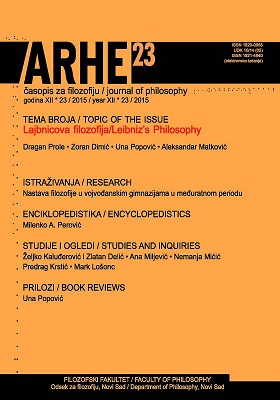Lajbnic i Dekart: od univerzalnog jezika do univerzalnog znanja
Leibniz and Descartes: From a Universal Language to Universal Knowledge
Author(s): Aleksandar MatkovićSubject(s): Epistemology, Early Modern Philosophy, Philosophy of Language
Published by: Филозофски факултет, Универзитет у Новом Саду
Keywords: combinatorics; Descartes; Leibniz; mathesis universalis; universal knowledge; universal language;
Summary/Abstract: The paper deals with the relation between Descartes’ project of Mathesis universalis and Leibniz’s universal language. Although there have been many attempts to develop such a language already in Leibniz’s time, what makes Leibniz stand out among them is an attempt to secure the foundations of such a language in a philosophical manner – the roots of Leibniz’s philosophical grounding of a lingua universalis have a Cartesian basis. Despite the fact that he criticized Descartes’ quest for universal knowledge from the days of the Regulae, Leibniz took up the basic motives of such pursuits when developing his own universal characteristic in the Ars Combinatoria in 1666. He attempts at nothing less than to provide a new answer to the need for establishing the sciences – instead of methodology and perception, Leibniz sees the criteria of scientifi city in the possibilities of language formalization. It is here that something foreign to Cartesian thought and very characteristic of Leibnitz’s system arises, something that will leave a mark on twentieth century thinkers ranging from Borges and Husserl to Foucault and Deleuze – namely, the notion of a sign as a basic expression of thought. The author later develops implications of this shift with relation to the basic motives of Leibniz’s philosophy – the concepts of combinatorics, monads and the relationship between a universal language and scientifi city.
Journal: Arhe
- Issue Year: 2015
- Issue No: 23
- Page Range: 63-87
- Page Count: 25
- Language: Serbian

